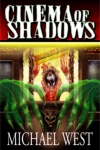Cinema of Shadows
Michael West
Seventh Star Press
Trade Paper, 298 pages, $15.95
Review by Sheila M. Merritt
Abandoned is generally a sad word. In horror fiction, however, it is a word with potential to terrify: A building that appears to be vacant can house malevolent mysteries. In Cinema of Shadows a once opulent and stately theater is left to decay. The Woodfield Movie Palace is tainted by a haunted history and scheduled for demolition; within the structure are remnants of its past: “Once valuable equipment covered over in a fluffy blanket of dust and grime. Rust slowly feasting on the metal carcasses of forgotten film canisters. A torn, rippled movie poster for Taxi Driver tacked to the far wall. Exposed film tossed in a shadowy corner to quietly dissolve away, its images lost to extreme heat, bitter cold, and time.” Yet, The Woodfield doesn’t lack for staff or patrons; the dead still linger there, held captive by an evil force.
Author Michael West expertly projects the specters, providing the narrative with vivid visuals. He is not quite as adept in depicting the living: The interaction between the romantic leads is a trifle stilted. The lovers’ tale unspools at an accelerated pace, rendering the emotion behind it superficial. Fortunately, the novel’s fearsome elements override the fumbled fondling.
The accursed cinema is the focus of a college professor’s study group. Along with the academic are four students, each of whom has had some kind of supernatural experience. Kim Saunders is the pupil who is most receptive to the otherworldly. Psychically sensitive since infancy, Kim has anxieties about her abilities. She is plagued by visions and frightening dreams, as is Professor Geoffrey Burke: “Awake, it was easy to bury his fears, to smother them beneath his day-to-day affairs, but when his subconscious was given free reign, it was quick to dig it all back up. In his lectures, he’d spoken at length on the phenomenon of residual haunting, on acts of violence so intense, so heinous that they generate a psychic reverberation, replaying actions over and over for all eternity like a compact disc with a deep, unforgiving gouge. His nightmares were like that, the same again, and again, and then again … the fear, the pleas, the agony.”
The agonizing dreams plaguing the professor are tied to the hideous entity who orchestrates the edifice’s malign machinations. The demon is possessive of the ghosts who remain theater bound. And revels in literal possession, as well. He relishes taking over bodies (both living and dead) and causing the inanimate to be animated. When the theater’s statuary gargoyles begin to attack, a frisson of terror is established: “It sat perched atop one of the gold columns that lined the wall to his left, a gothic nightmare with forged wings and metal claws. Its dog-like snout should have pointed straight ahead, a mirror of its twin on the opposite side of the auditorium. But now … now its face tilted down at him; fanged mouth open in a mute growl, yellow tongue curled, polished eyes narrowed.”
As nasty as these beasties are, it is the revenants who enliven this book. The ghastly and the ghostly; murderers and suicides, killers and victims, comprise a group that elicits profound dread. These creepy combusted cadavers who eluded cremation are a fine example: “Surrounding them were corpses. They filled the gallery’s once empty seats, their charred faces staring out at him with white, scalded eyes. Some had scattered patches of hair, brittle, blackened, like burnt straw, others had been reduced to bald, grinning skulls. Their features had melted and clotted into lumpy, twisted landscapes before crusting over. They sat up, singed, tattered clothing hanging from their skeletal frames, their movements accompanied by the dry rustling sound of dead leaves.”
Cinema of Shadows works beautifully when dealing with the stuff of nightmares. The narrative loses ground, however, when the bed scenes aren’t about bad dreams and the story addresses the prosaic. Michael West appreciates horror, and is extremely skilled at conveying eeriness and creating terrifying situations. If he eventually elevates his characters’ actions and dialogue in more mundane situations, the resulting work could be outstanding.









